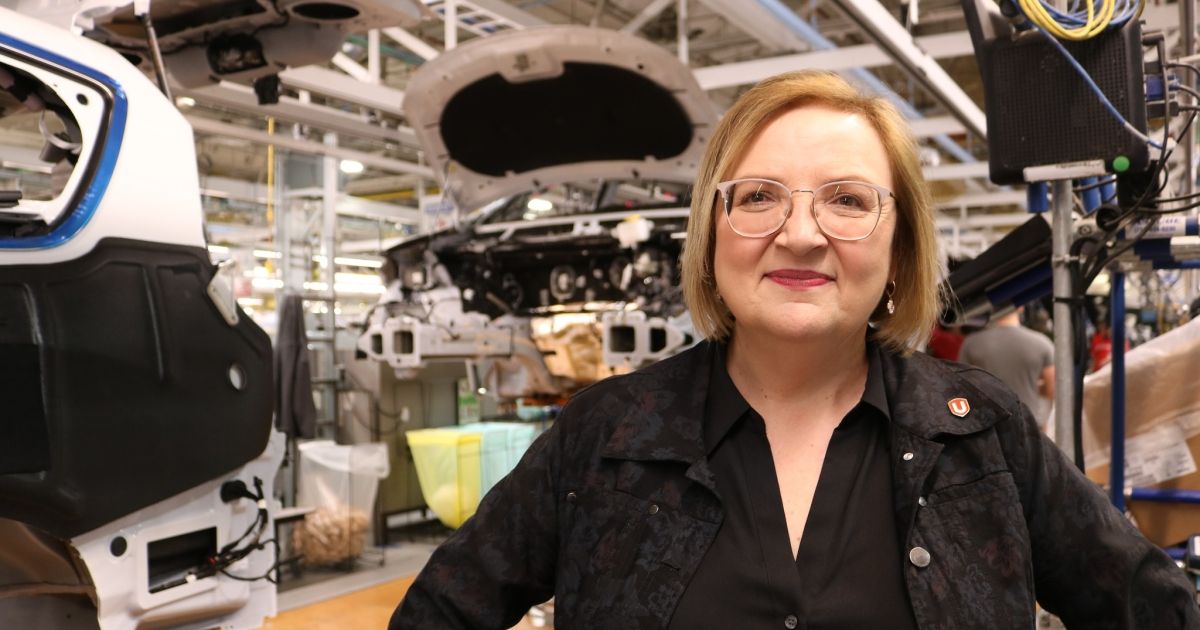
Today, Unifor officially opens contract talks with the Canadian divisions of the Detroit Three automakers Ford, General Motors and Stellantis. These talks will be the most consequential and closely watched in decades.
The 18,000 Unifor members covered by these collective agreements head into negotiations with similar challenges to what workers are facing across the industrial sector.
Wages haven’t kept up with rising inflation and certainly don’t reflect the recent record-setting profits of employers.
And pensions, especially for new hires, are precarious and sub-standard.
Even though our union salvaged the plans of senior members despite two bankruptcies, there hasn’t been a single adjustment to that plan in 15 years.
Below the surface lie another set of challenges very specific to the auto industry, fuelling constant work insecurity. Parts shortages and supply chain breakdowns have hit Unifor members hard for the past three years. Autoworkers face regular bouts of layoff and hardly know when they are working week-to-week.
Many have been forced to lean heavily on EI and negotiated income security measures that those benefits have dried up.
A challenging situation is unfolding and despite the excitement over the shift to electric cars, many of the transition plan’s details haven’t been ironed out. Autoworkers are rightly concerned. The solution is to make income and job security protections more robust so workers can better manage these down periods.
These are the hard realities of an industry in transition. And Canadian autoworkers deserve a plan that puts their needs first.
In the last round of negotiations, each automaker committed to make substantial investments in our Canadian factories, with a healthy portion dedicated to retrofitting plants to build next-generation electric vehicles. It also brought back truck production to Oshawa and reopened GM’s idled assembly line. Not a bad result for bargaining against the backdrop of a pandemic.
It was a result that proved a catalyst in Canada’s recent auto industry renaissance.
Since the last collective agreements were signed in 2020, Canada has seen more than $25 billion injected into a burgeoning auto supply chain. That’s because the work of our union hasn’t stopped. We’ve relentlessly championed Canada as a global automotive powerhouse, pressing automakers and governments to focus energy and incentives on expanding the production footprint. Two new battery plants will be built and are the biggest factory investments in Canadian automotive history. These projects will rejuvenate communities, create tens of thousands of new jobs, and help chart Canada’s path towards net zero. And these will be good-paying, union jobs. We will make certain of that.
Canada’s auto industry is on the upswing. So much of that is a testament to the high skill and hard work of Unifor members. What autoworkers have done to keep the industry afloat, particularly while many had written off the industry for dead, is truly remarkable. The inevitable conclusion is that they are the best at what they do, anywhere in the world.
Investments in auto manufacturing are on the rise. Factories are being built. Governments are putting in their share too. The math speaks for itself. The return on investment to the economy is exponential.
How we navigate the road ahead will be the defining question in this round of talks.
It’s hard to predict how things will unfold in any set of negotiations. A lot will happen between now and our September 18 deadline. We are keeping close watch of parallel talks between UAW-represented autoworkers and the Detroit automakers as well, and we are in contact with the union there. Regardless of what transpires over the coming months, we will chart a distinctly Canadian path just as our union has done for nearly 40 years.
Canada’s auto sector has come a long way from the dark days of the financial crisis.
For the first time in a generation, we are headed to the bargaining table with clear signs of a bright future ahead.
Canadian autoworkers sacrificed a lot to help this industry rebuild itself for success and its success is undeniable.
Now workers are looking for an agreement that puts their needs first.
- Lana Payne
https://news.google.com/rss/articles/CBMiYWh0dHBzOi8vd3d3LnVuaWZvci5vcmcvbmV3cy9hbGwtbmV3cy9jYW5hZGlhbi1hdXRvLXdvcmtlcnMtZGVtYW5kLWEtdHJhbnNpdGlvbi1wdXRzLXdvcmtlcnMtZmlyc3TSAQA?oc=5
2023-08-10 11:27:37Z
2294537131
Tidak ada komentar:
Posting Komentar